Final Report
Dates and location
25 August — 29 August 2025, Metz, France
Chairperson
Pr. Michel GRADECK, Université de Lorraine (France)
Co-chairperson
Pr. Alidad AMIRFAZLI, York University (Canada) & Dr. Stéphane DORBOLO, Université de Liège (Belgium)
Conference fees
- Registration fees Senior - early bird [excluding VAT - Lunch included]: 480.00 €
- Registration fees Senior: 590.00 €
- PhD student Registration fee - early bird [excluding VAT - Lunche included]: 300.00 €
- PhD student Registration fee: 330.00 €
What other funding was obtained?
We received support from LEMTA Laboratory (1000euros). The diner organized at El Theatris restaurant during the colloquium was offered by the french CNRS network TRANSINTER. Additionaly, University of Lorraine (through my lab) paid for the travel (fly tickets and train) and accomodation expenses during the colloquium of one co-chair (Alidad Amirfazli) and for one plenary lecturer (Gretar Tryggvason).
What were the participants offered?
At the beginning of the colloquium, we proposed to all participant to assist for free to the plenary lectures given at the conference centre "Robert Schuman" during the opening session of the french mechanical conference. At the end of the opening sessions, all attendes were offered a Welcome cocktail at the conference center "Robert Schuman". During the colloquium, attendes had Coffee break in the morning and in the afternoon, lunches, a diner downtown (on wednesday evening) & a gala diner at the stadium of Metz (on thursday evening), a free visit of ArcelorMittal research center (transport by bus was for free). Additionaly all attendes received a pass for the public transport in Metz
Applicants (members)
- Guillaume Castanet
- Catherine Colin
- Luc Favre
- Nicolas Riaud
- Christian Ruyer-Quil
- Julien Sebilleau
Applicants (non members)
- Frédy Abadassi
- Jerome Bellettre
- Anne-Laure Biance
- Céline Cohen
- Georg Dietze
- Stephane Dorbolo
- Tatiana Gambaryan-Roisman
- Ghassan Ghazal
- Giovanni Ghigliotti
- Anne Gosset
- Michel Gradeck
- Uwe Janoske
- Christophe Josserand
- Grégoire Le Lay
- Pablo López Gavilán
- Evgeny Mogilevskiy
- Misagh Mokhtari
- Seiler Nathalie
- Vadim Nikolayev
- Arthur Oliveira
- Carole Planchette
- Giuseppe Pucci
- Maxime Quentin De Gromard
- Ilia Roisman
- Rahul Sathyanath
- Benoit Scheid
- Juliette Seillier
Scientific report
During the Euromech colloquium 651 "Films, bubbles, droplets and phase change" , afer a short opening session by the chair of the colloquium (M. Gradeck), six different sessions were proposed : S1 - industrial issues (chairman, Pr A. Amirfazli), S2 - Droplets (Chairman, Dr S. Dorbolo), S3 - Flowing films (chairman, Dr G. Dietze), S4 - Bubbles & Droplets dynamics (chairman, Pr N Rimbert), S5 - Fluid Interfaces and Droplet Dynamics (Chairman, Dr A. Olivira), S6 - Boiling frontiers (Chairman, Dr J. Sébilleau). Aditionnaly, we organized also a visit of the ArcelorMittal Research center in Maizières les Metz where attendes could see different semi-industrial pilots.
At the beginning of the colloquium, during S1, we had one plenary lecture given by professor Gretar Tryggvason (Johns Hopkins University, USA) and two keynotes given by industrial colleagues from ArcelorMittal and Air Liquide followed by a panel session entitled " Key issues for numerical modelling and data management in industrial systems?" in which the speakers of the sessions plus one expert in the field of nuclear energy were asked to give their insights regarding their own field of application. Each other scientific sessions includes one or two plenary lectures (1h00 each) followed by keynotes (30mm each) and short talk (20mm each). The plenary lecturers and the keynotes lecturers were invited by the scientific commitee to participate while the participant given a talk were selected.
The list of the plenary lecturers is the following:
- S1 - Industrial issues: Pr. Gretar Trygvason (Johns Hopkins University - USA) " Fully Resolved Simulations of Complex Multiphase Flows "
- S2 - Droplets: Pr. Tatiana Gambaryan-Roissman (TU Darmstadt – Germany) "Drops of pure liquids and nanosuspensions on porous coatings: imbibition, evaporation, and deposit formation"
- S3 - Flowing Films: Pr Christian Ruyer-Quil (USMB - France) " Advances on the modelling of falling liquid films "
- S4 - Bubbles & Droplets dynamics: Pr. Ana S. Moita (University of Lisbon – Portugal) "bubbles & drops dynamics on micro--and-nano-enhanced interfaces: microscale approach for (macro) industrial applications "
- S5 - Fluid Interfaces and Droplet Dynamics: Pr. Uwe Janoske (University of Wuppertal, Germany) "Interaction of droplets with aerodynamic forces and mechanical vibrations"
- S6 - Boiling frontiers: Dr Vadim Nikolayev (CEA Paris-Saclay – France) "Phenomena in the close heater vicinity at nucleate boiling: experimental and numerical studies "
- S6 - Boiling frontiers: Dr. Sébastien Tanguy (Université Paul Sabatier, IMFT, France) "A numerical solver for compressible two-phase flows. Applications to hydrodynamic cavitation and pool cavitation "
The list of the keynote lecturers is the following:
- S1 - Industrial issues: K1 : Dr Jacopo Seiwert & Dr Lionel Vincent (Air Liquide – France) "Keeping it Cool at Air Liquide: Hot topics in Cryogenic Distillation" ; K2 : Dr Ghassan Ghazal (Arcelormittal Research – France) "Multiscale modelling approaches in metallurgical and mineral processing at ArcelorMittal"
- S2 - Droplets: K3 : Pr. Jérôme Bellettre (Université de Nantes, France) "Atomization of emulsified alternative fuel assisted by water drops sudden vaporization (micro-explosion)"; K4 : Dr. Guillaume Castanet (CNRS LEMTA, France) "Heat and Mass Transfers in Droplet Flows - Recent Advances Using LIF" ; K5 : Dr Arthur Oliveira (EESC-USP, Brazil) "Jet and spray quenching near-industrial conditions: results and next steps"
- S3 - Flowing Films: K6 : Ass. Pr Dr Anne Gosset (Universidade da Coruña, Spain) "Liquid films interacting with gas jets" ; K7 : Pr Catherine Colin (IMFT, France) "Heat transfer through a vertical liquid film in upward and downward flows" ; K8 : Dr Georg Dietze (FAST, France) "A new short-wave instability mode in falling liquid films sheared by a counter-current gas flow"
- S4 - Bubbles & Droplets dynamics: K9 : Ass. Pr Dr Julien Sébilleau (Université Paul Sabatier, IMFT, France) "Sliding droplet sheared by an air flow" ; K10 : Pr Benoit Scheid (ULB, Belgium) "Bubble and droplet dynamics in inertial microfluidics" ; K11 : Ass. Pr Dr Carole Planchette (TU Graz, Autriche) "Drops collisions and fragmentation mechanisms" ; K12 : Dr Giuseppe Pucci (CNR, INFN and University of Calabria, Italy) "Capillary surfers at a vibrating fluid interface"
- S5 - Fluid Interfaces and Droplet Dynamics: K13: Pr Nicolas Rimbert (Université de Lorraine, LEMTA, France) "Interplay between fragmentation and agglomeration in spray dynamics"; K14: Dr Baraa Qaddah (IRTM2P, Metz, France) "Primary and secondary breakup of molten Ti64 in an EIGA atomizer for metal powder production" ; K15 : Ass. Pr Dr. Céline Cohen (Institut de Physique de Nice, France) "Receding contact line dynamics on super hydrophobic surfaces" ; K16 : Dr. Anne Laure Biance (CNRS, Institut Lumière Matière, France) "Triboelectricity in a droplet impacting a superhydrophobic surface: coupling between electrostatics and hydrodynamics" ; K17: Dr Jérôme Moritz (CNRS IJL, France) "Advancing Liquid Metal Divertors in magnetic confinment devices: Plasma Interaction, Heat Exhaust, and Fabrication Challenges "
- S6 - Boiling frontiers: K18: Pr Prashant Valluri (University of Edimburgh, Scotland) "Phase-Change of Liquid Mixtures: Stability Analyses, Direct Numerical Simulations and Experiments "
We had one keynote lecture given remotly by Pr Prashant Vallury during the S6 - Boiling Frontiers. We also had two no-show during session 3 (Talk 4 and Talk7) from iranian colleague who do not succeed to get a visa ; we could organized a visio-conference for them but the internet was too instable to do that.
We had the participation of 5 colleagues coming from the industry ; this kind of particpation were encouraged by the scientific commitee in order to get more insight from the current issues faced by industry to improve their own processes and also to contribute to the energy transition to reduce carbon emission.
The details of the origin of the participant is given later in this report.
To the opinion of the attendes, this first edition of the colloquium "Films, bubbles, droplets and phase change" was a success regarding the networking, the quality of the presentation, the good balance between very fundamental works and more applied research. The panel session organized during session 1 was also appreciated because we listed a lot of issues regarding the numerical simulations of industrial processes and also we questioned the role of AI in thes kind of simulation. Below some of the questions which were posed to the panel participant to open the discussion:
- How can one choose between various schemes of e.g., Eulerian, mixture, VOF, Level-Set, to arrive at the best approach for industrial multiphase‑phase-change workflows in your experience?
- What do you see as the role of machine learning, if you use it, reduced order modeling, or in-situ adaptive refinement to speed up simulations for industrial applications?
- In industry, generally do you use what software has been traditionally available to you, or calibrated for your particular type of work, or seek out new methods as well if you have a choice? additional question :”How do you practice, if you do simulation governance to ensure reproducibility, version control, traceability, and continuous validation across (industrial) deployments?
- during the development of a code, what efforts are devoted to the experimental data validation, when it is done, or why this step maybe bypassed ?
- What is the state of application of machine learning and the level of trust put in its role in simulation domain? (this is provocative but, in traditional numerical simulations, people are rather good in convergence tests, in error managing. This is less obvious in machine learning for which we do not have a clear equivalence to the error bars)
- In most of the case, what are simulations used to : prediction or understanding ? What is the mainstream software for the moment in your industry ? What is the place of home-made code development in the Academic world for industrial applications?
during gala diner at the stadium
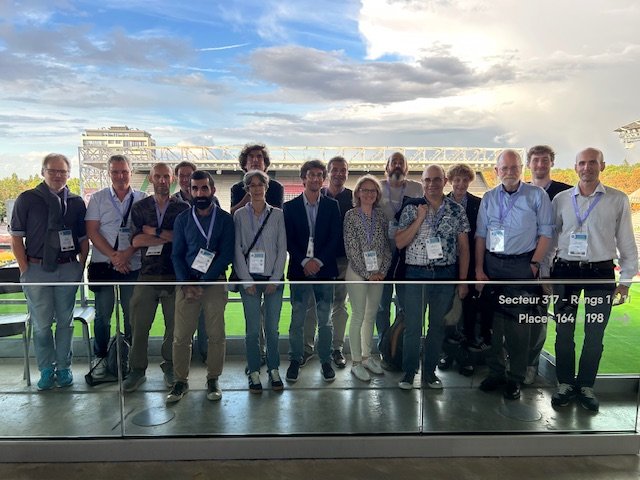
group photo in front of the building - Campus of Université de Lorraine (Metz, France)
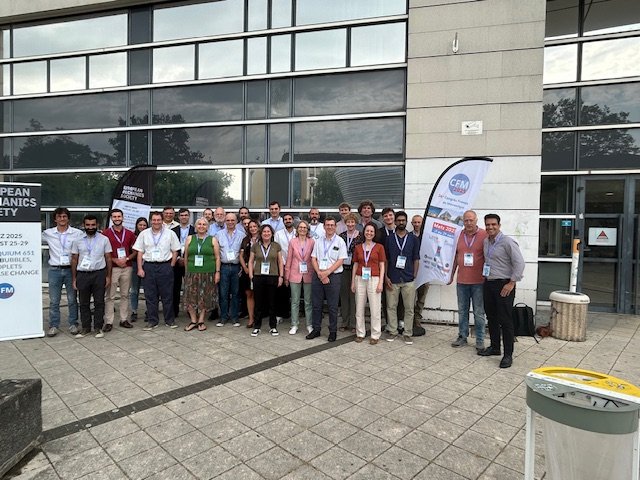
Concentrated attendes during the colloquium
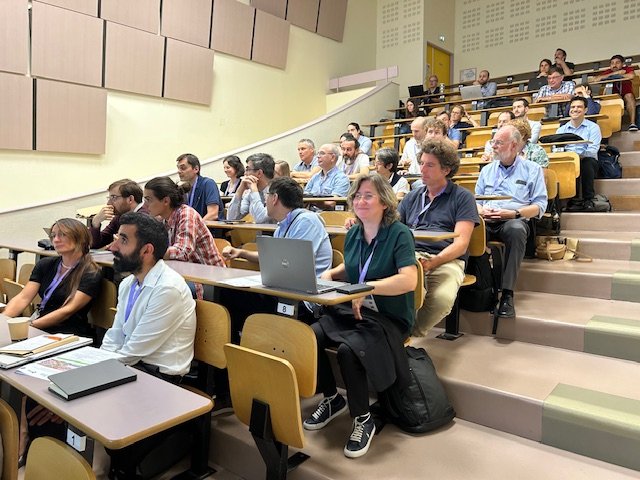
Gala diner at the stadium
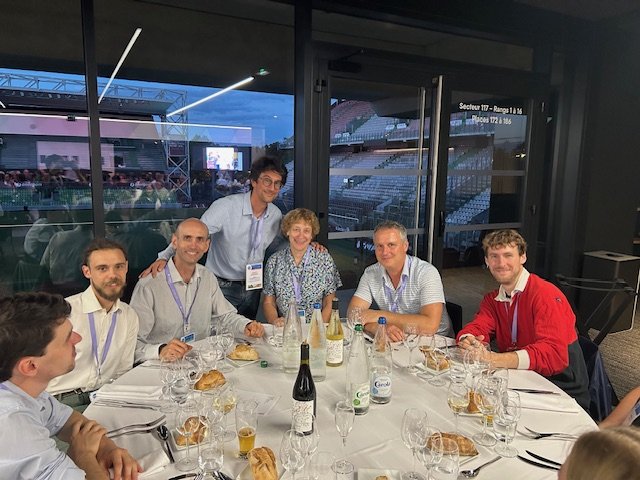
diner during the colloquium (next to the campus) : French, German, Italian and Brazilian people
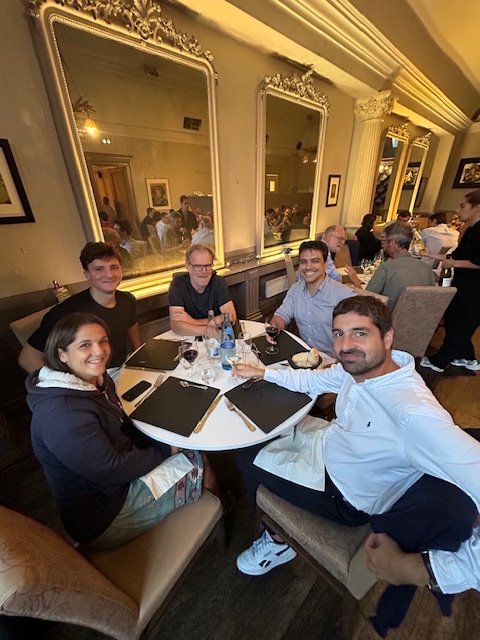
diner during the colloquium (next to the campus) : French, US and Canadian with a special guest (Dr S. Popinet)
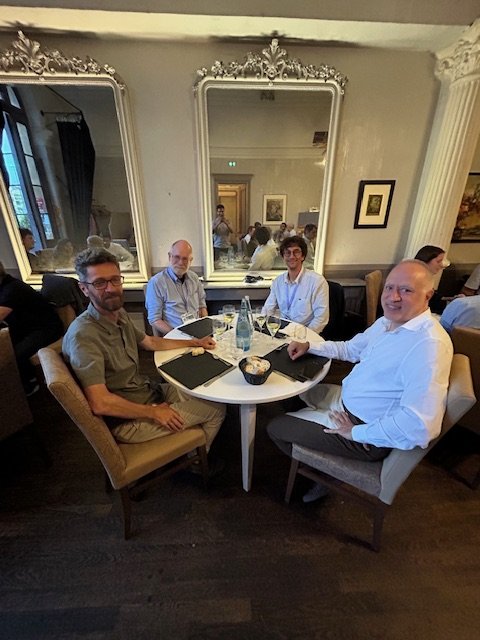
Number of participants from each country
| Country | Participants |
|---|---|
| France | 21 |
| Germany | 3 |
| Belgium | 2 |
| Spain | 2 |
| Israel | 1 |
| Iran | 1 |
| Brazil | 1 |
| Austria | 1 |
| Italy | 1 |
| Total | 33 |
